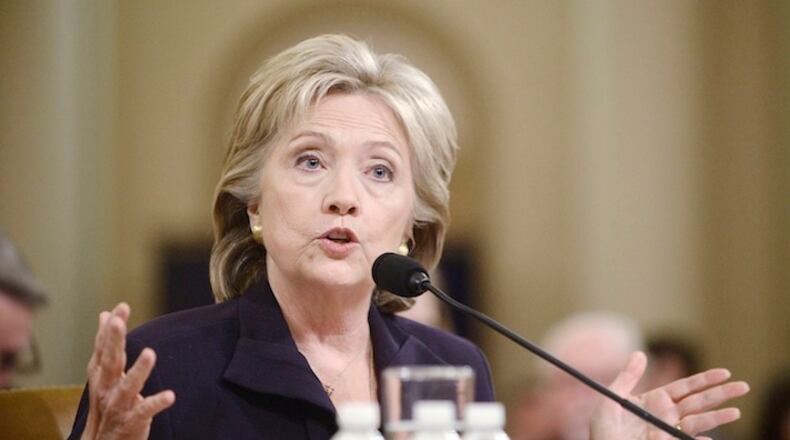A powerful Senate committee has given the Justice Department until Thursday to disclose whether it's investigating reported Ukrainian efforts in the 2016 election on behalf of Democratic candidate Hillary Clinton.
If Justice says it's not investigating the allegations, the Senate Judiciary Committee's chairman wants to know why they're not.
"Are you investigating the Ukrainian government's intervention in the 2016 presidential election on behalf of the Clinton campaign?" reads the letter from Sen. Chuck Grassley, R-Iowa, to Deputy Attorney General Rod Rosenstein. "If not, why not?"
It's also the third such congressional Republican effort in the last week aimed at launching, or reopening, investigations into Clinton's campaign. House Judiciary Committee Republicans formally requested documents relating to the FBI's campaign investigation and 20 committee GOP members sent a seven-page letter to Justice asking a special counsel be named for a Clinton probe. Justice has not responded.
These efforts follow President Donald Trump's repeated public scolding of his own attorney general as well GOP lawmakers for not investigating Clinton while allowing an investigation of his campaign's ties to Moscow to deepen.
Last week, Trump tweeted: "Ukrainian efforts to sabotage Trump campaign — 'quietly working to boost Clinton.' So where is the investigation A.G."
Ukraine was quick to deny any efforts to interfere in the election. The Ukrainian Embassy in Washington issued a statement on Twitter: "We stand by our words that the government of Ukraine didn't help any candidate in Election. Ukraine is proud of bipartisan support in the U.S."
Special counsel Robert Mueller is investigating possible ties between Russia and the Trump campaign, but Susan Low Bloch, constitutional law professor at Georgetown University, saw important practical differences that go beyond what seems to be substituting Ukraine for Russia in the Grassley request.
"The Russian investigation is predicated on reports by U.S. intelligence agencies," she noted. "Those intelligence agencies haven't publicly announced that they're in agreement that Ukraine interfered in the election."
Bloch warned, "It's a little dangerous for any branch of government to accuse a country of doing something without a predicate. It is certainly legal, but it seems unwise."
Grassley's questions revolve around media reports that a "Ukrainian-American operative" named Alexandra Chalupa, while working with the Democratic National Committee, met with Ukrainian officials during the presidential election for the express purpose of exposing alleged ties between then-candidate Donald Trump, Paul Manafort and Russia.
Grassley's letter quotes a Financial Times article in which Ukrainian legislator Serhiy Leschenko, saying that Trump's candidacy led "Kiev's wider political leadership to do something they would never have attempted before: Intervene, however indirectly, in a U.S. election."
The letter cites media articles in stating that the Ukrainian Embassy staff in Washington, D.C., was working to arrange an interview with Ukrainian President Petro Poroshenko on the topic and was "coordinating an investigation with the Hillary team on Paul Manafort." Manafort was a Trump campaign manager.
Four of Grassley's concerns in the letter deal with whether Chalupa abided by the Foreign Agents Registration Act. His committee is supposed to oversee how the act is implemented. Specifically, the letter asks if she has failed to properly register, and has been questioned about that failure.
Beyond that, the letter asks, "Are you investigating the Ukrainian government's intervention in the 2016 presidential election on behalf of the Clinton campaign? If not, why not?"
It follows that question by asking, "Are you investigating links and coordination between the Ukrainian government and individuals associated with the campaign of Hillary Clinton or the Democratic National Committee? If not, why not?"
The Russia investigation, which began in the summer of 2016, was explained in a joint report earlier this year reflecting the findings of the CIA, FBI and National Security Agency.
Most dramatically, a declassified joint report stated: "We assess Russian President Vladimir Putin ordered an influence campaign in 2016 aimed at the US presidential election."
The intelligence agencies went on to state that "Russia's goals were to undermine public faith in the U.S. democratic process, denigrate Secretary Clinton, and harm her electability and potential presidency. We further assess Putin and the Russian government developed a clear preference for President-elect Trump."
Two months later, in a House Intelligence Committee hearing, former FBI Director James Comey said the "unusual circumstances" and "public interest" of the Russian matter resulted in him being authorized to "confirm that the FBI, as part of our counterintelligence mission, is investigating the Russian government's efforts to interfere in the 2016 presidential election."
Comey, since fired by Trump, went on to add that the bureau is studying "the nature of any links between individuals associated with the Trump campaign and the Russian government and whether there was any coordination between with the Trump campaign and the Russian government."
That investigation, he said, would "include an assessment of whether any crimes were committed."
About the Author
The Latest
Featured


